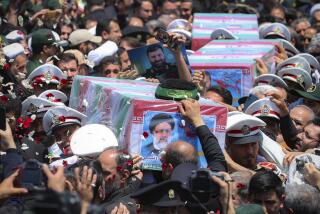Iran: Too Early to Tell
- Share via
The most savage tyranny of recent history ended with the death of Iran’s Ayatollah Ruhollah Khomeini over the weekend. From his overthrow of the shah in 1979 through his commitment of battalions of children to slaughter in the war against Iraq to the taking of hostages in the Middle East, Khomeini led with an unrelenting loathing for the West and a contempt for life.
But the masses of grieving faithful around his glass coffin in Tehran and the quick decision on a successor to show that the clergy remains in control make it unlikely that major change in Iran’s relations with the West are in prospect. Khomeini may have failed to export his revolution of Islamic fundamentalism, but it still will restrain any impulse for major change on the part of his immediate successor, President Ali Khamenei, or other leaders who may emerge after elections in August. That does not mean that Iran will, or should, forever stand apart from the global community of nations. It just means it will be along time before it feels free to make a conciliatory move toward the United States, Khomeini’s “Great Satan,” or other Western countries.
It will take time even to discover whether the tyrant’s death sentence imposed on author Salman Rushdie for writing “Satanic Verses” will be lifted. It will take even longer, no doubt, to discern the effect that his death will have on hostages taken in the Middle East by, or in behalf of, Iranians. Just which of several candidates for power, none of whom could carry the moral authority of Khomeini, will wind up on top is not clear. But being seen as soft on America by signaling an imminent end to the nightmare of hostages would almost certainly guarantee a candidate’s winding up near the bottom.
The Iran-Contra scandal gave the word moderate a bad name, but there are leaders and emerging leaders who understand that they need to heal relations with the West. They will have their day, as the memory of Khomeini fades.
More to Read
Sign up for Essential California
The most important California stories and recommendations in your inbox every morning.
You may occasionally receive promotional content from the Los Angeles Times.










